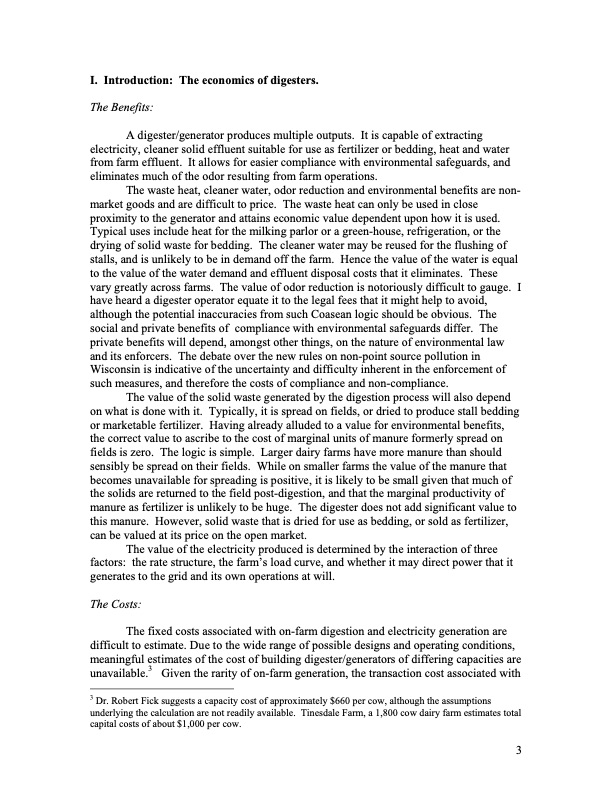
PDF Publication Title:
Text from PDF Page: 004
I. Introduction: The economics of digesters. The Benefits: A digester/generator produces multiple outputs. It is capable of extracting electricity, cleaner solid effluent suitable for use as fertilizer or bedding, heat and water from farm effluent. It allows for easier compliance with environmental safeguards, and eliminates much of the odor resulting from farm operations. The waste heat, cleaner water, odor reduction and environmental benefits are non- market goods and are difficult to price. The waste heat can only be used in close proximity to the generator and attains economic value dependent upon how it is used. Typical uses include heat for the milking parlor or a green-house, refrigeration, or the drying of solid waste for bedding. The cleaner water may be reused for the flushing of stalls, and is unlikely to be in demand off the farm. Hence the value of the water is equal to the value of the water demand and effluent disposal costs that it eliminates. These vary greatly across farms. The value of odor reduction is notoriously difficult to gauge. I have heard a digester operator equate it to the legal fees that it might help to avoid, although the potential inaccuracies from such Coasean logic should be obvious. The social and private benefits of compliance with environmental safeguards differ. The private benefits will depend, amongst other things, on the nature of environmental law and its enforcers. The debate over the new rules on non-point source pollution in Wisconsin is indicative of the uncertainty and difficulty inherent in the enforcement of such measures, and therefore the costs of compliance and non-compliance. The value of the solid waste generated by the digestion process will also depend on what is done with it. Typically, it is spread on fields, or dried to produce stall bedding or marketable fertilizer. Having already alluded to a value for environmental benefits, the correct value to ascribe to the cost of marginal units of manure formerly spread on fields is zero. The logic is simple. Larger dairy farms have more manure than should sensibly be spread on their fields. While on smaller farms the value of the manure that becomes unavailable for spreading is positive, it is likely to be small given that much of the solids are returned to the field post-digestion, and that the marginal productivity of manure as fertilizer is unlikely to be huge. The digester does not add significant value to this manure. However, solid waste that is dried for use as bedding, or sold as fertilizer, can be valued at its price on the open market. The value of the electricity produced is determined by the interaction of three factors: the rate structure, the farm’s load curve, and whether it may direct power that it generates to the grid and its own operations at will. The Costs: The fixed costs associated with on-farm digestion and electricity generation are difficult to estimate. Due to the wide range of possible designs and operating conditions, meaningful estimates of the cost of building digester/generators of differing capacities are unavailable.3 Given the rarity of on-farm generation, the transaction cost associated with 3 Dr. Robert Fick suggests a capacity cost of approximately $660 per cow, although the assumptions underlying the calculation are not readily available. Tinesdale Farm, a 1,800 cow dairy farm estimates total capital costs of about $1,000 per cow. 3PDF Image | The Economics and Feasibility of Electricity Generation using Manure Digesters on Small and Mid-size Dairy Farms

PDF Search Title:
The Economics and Feasibility of Electricity Generation using Manure Digesters on Small and Mid-size Dairy FarmsOriginal File Name Searched:
Biogas_Economics_Mehta.pdfDIY PDF Search: Google It | Yahoo | Bing
Capstone Turbine and Microturbine: Capstone microturbines used and new surplus for sale listing More Info
Consulting and Strategy Services: Need help with Capstone Turbine, sizing systems, applications, or renewable energy strategy, we are here to assist More Info
Container Lumber Dry Kiln: Since 1991 developing and innovating dry kilns using standard shipping containers More Info
Supercritical CO2 Lumber Dry Kiln: Compact fast drying in 3 days or less for small amounts of wood and lumber drying More Info
BitCoin Mining: Bitcoin Mining and Cryptocurrency... More Info
Publications: Capstone Turbine publications for microturbine and distributed energy More Info
FileMaker Software for Renewable Energy Developing database software for the renewable energy industry More Info
CO2 Gas to Liquids On-Demand Production Cart Developing a supercritical CO2 to alcohol on-demand production system (via Nafion reverse fuel cell) More Info
Stranded Gas for low cost power Bitcoin Mining Using stranded gas for generators may provide breakthrough low power costs for cryptocurrency miners. More Info
| CONTACT TEL: 608-238-6001 Email: greg@globalmicroturbine.com | RSS | AMP |